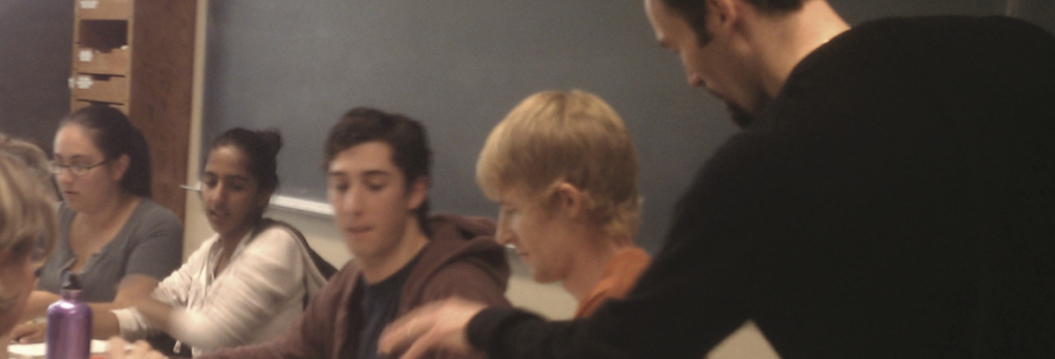
We offer many courses relevant to paleoanthropology at UC Davis. Currently, courses of interest include:
Lower Division
1. Human Evolutionary Biology (4)
Lecture—3 hours; discussion—1 hour. Processes and course of human evolution; primatology; biological and social diversity within Homo sapiens; human paleontology. GE credit: SciEng, Div, Wrt | SE, SL, WE. Taught by various faculty, including Tim Weaver.
1Y. Human Evolutionary Biology (4)
Web virtual lecture—2 hours; lecture/discussion—1 hour; laboratory/discussion—1 hour. Evolutionary theory and mechanisms of evolution; basic population and quantitative genetics; primatology; biological and cultural diversity within Homo sapiens; paleoanthropology. Students may not take both course 1 and course 1Y for credit. GE credit: SE, WE.—I, II, III, IV. (I, II, III, IV.) Taught by Tim Weaver.
3. Introduction to Archaeology (4)
Lecture—3 hours; discussion—1 hour. Development of archaeology as an anthropological study; objectives and methods of modern archaeology. GE credit: SciEng or SocSci, Div | SE, SL. Taught by various faculty, including Teresa Steele.
23. Introduction to World Prehistory (4)
Lecture—3 hours; discussion—1 hour. Broadly surveys patterns and changes in the human species' physical and cultural evolution from earliest evidence for “humanness” to recent development of large-scale complex societies or “civilizations.” Lectures emphasize use of archaeology in reconstructing the past. GE credit: SocSci, Div, Wrt | SS, WC, WE. Taught by various faculty, including Nicolas Zwyns.
Upper Division
151. Primate Evolution (4)
Lecture—3 hours; discussion—1 hour. Prerequisite: course 1 or Biological Sciences 1B. Origin and relationships of the prosimians, monkeys, and apes. GE credit: SciEng, Wrt | SE, WE. Taught by Lynne Isbell.
152. Human Evolution (5)
Lecture—3 hours; discussion—1 hour; term paper. Prerequisite: course 1 or Biological Sciences 1B. Nature and results of the evolutionary processes involved in the formation and differentiation of humankind. GE credit: SciEng, Wrt | SE, WE. Taught by Nicolas Zwyns.
156A. Human Osteology (4)
Lecture—2 hours; laboratory—4 hours. Prerequisite: course 1 or equivalent. Human skeleton from archaeological, forensic, and paleontological perspectives, including anatomical nomenclature, variation with sex and age, function, evolution, growth, and development of bones and teeth. Hands-on study and identification of human skeletal remains. Cannot be taken by students who have previously completed course 156. GE credit: SciEng | SE. Taught by Tim Weaver.
156B. Advanced Human Osteology (4)
Lecture—2 hours; laboratory—4 hours. Prerequisite: course 156A or equivalent. Human skeletons from archaeological, forensic, and paleontological contexts. Bone and tooth structure, growth, and development; measurement, statistics, and biomechanics; assessment of age, sex, weight, height, and ancestry; and indicators of illness, injuries, diet, and activities. Offered in alternate years. GE credit: SciEng | SE. Taught by Tim Weaver.
160. Neandertals and Modern Human Origins (4)
Lecture—3 hours; discussion—1 hour. Prerequisite: course 1 or equivalent. Origins, evolution, and disappearance of Neandertals. Emergence of humans like us in both anatomy and behavior. Interpretation of the fossil and archaeological records of Europe and Africa. Genetics of living and fossil humans. Offered in alternate years. GE credit: SciEng | SE. Taught by Tim Weaver.
174. European Prehistory (4)
Lecture—3 hours; discussion—1 hour. Prerequisite: course 3 or consent of instructor. Survey of the prehistory of Europe from its earliest human inhabitants, to the Neandertals and first modern humans, and through early agricultural and complex societies. Analysis and interpretation of the European archaeological record for understanding human dispersals into Europe. Offered in alternate years. GE credit: SocSci | SS, WC, WE. Taught by Teresa Steele.
177. African Prehistory (4)
Lecture—3 hours; discussion—1 hour. Prerequisite: course 3 or consent of instructor. Survey of prehistory of Africa from early human ancestors, through modern human origins, and into early agricultural and complex societies and the Bantu expansion. Analysis and interpretation of the African archaeological record, incorporating human paleontology and genetics. Offered in alternate years. GE credit: SocSci | SS, WC, WE. Taught by Teresa Steele.
179. Asian Prehistory (4)
Lecture—3 hours; discussion—1 hour. Prerequisite: course 3 or consent of instructor. Survey of the prehistory of Asia from the earliest human occupations to the rise of complex societies. Special focus on fossil and archeological records. Offered in alternate years. GE credit: SocSci. Taught by Nicolas Zwyns.
180. Zooarchaeology (4)
This course covers the theories and methods for studying animal skeletal remains from archaeological sites. Particular attention will be paid to identification and quantification of zooarchaeological material, to various cultural and natural processes that affect animal bones pre- and post-burial, and to the use of faunal remains for determining past human diets and environments. Taught by Chris Darwent and Teresa Steele.
Graduate
202. History and Theory of Biological Anthropology (4)
Seminar—3 hours; term paper. History of thought in biological anthropology and analysis of major theoretical problems in the field. Suggested for all first-year graduate students lacking intensive preparation in biological anthropology. Taught by Tim Weaver.
216. Problems in Archeological Method (4)
Seminar—3 hours; term paper. Techniques for analyzing archeological data; application to various prehistoric cultures. May be repeated for credit with consent of instructor. Variations of this class include special focus on “Advanced Zooarchaeology” and “Proposal Writing” Taught by Chris Darwent and Teresa Steele.
252. Human Evolution Seminar (4)
Seminar—3 hours; term paper. Prerequisite: course 152 or the equivalent; consent of instructor. Study of selected topics in human evolutionary studies. Each year course will focus on one or more of the following: molecular evolution, primate evolutionary biology, Tertiary hominoids, Australopithecus, Homo erectus, archaic Homo sapiens, brain evolution. Each time this course is taught it will focus on a different topic in human evolution. Contact the instructor for more details. May be repeated for credit. Taught by Tim Weaver and Nicolas Zwyns.
A complete listing of all courses offered by the Anthropology department can be found here. Graduation requirements for undergraduate students can be found here.
You can register for courses using the UC-Davis Schedule Builder web tool, accessible here.
Many of us also participate in outreach activities through the UC Davis Department of Anthropology Museum, where we give presentations on Archaeological Methods, Prehistoric Technology, Human Physical Variation, Human Evolution, Microevolution, Primatology, Ancient DNA, and other topics to visiting K-12 students.
